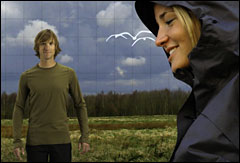
Eric Brody.
What work do you do?
I am the sustainability manager at Nau Inc.
My other involvements include founder and coordinator of Portland Green Drinks; executive committee member for the Sustainable Packaging Coalition; and advisory committee member for the Oregon Natural Step Network.
How does your work relate to the environment?
Nau, Inc. is a retail (as well as direct) technical and lifestyle outdoor clothing company committed to integrating economic, environmental, and social factors into our business model. We aim to spark a dialogue among individuals and companies who are committed to doing well by doing good. We have aspired to design the entire enterprise from the ground up with the idea and ideal of sustainability at the center of the venture. That includes how we design and manufacture our products, the design and construction of our stores, how our products are shipped, and the people we hire. We give 5 percent of every sale to social and environmental organizations. Customers are encouraged to help decide which organization will receive that 5 percent.
What are you working on at the moment?

Stay warm, look cool.
Photo: Nau, Inc.
I’m working on wearing many hats without messing up my hair. Seriously, one of the exciting aspects of sustainability, especially in a start-up, is the wide range of projects. They include integrating sustainability attributes into our materials, products, processes, and stores; developing labor and environmental standards for the factories that make our products; and tracking, reducing, and offsetting our greenhouse-gas emissions.
We’re working with Verité, an independent auditing and research organization that performs third-party audits, to ensure that our requirements relating to human rights, environmental practices, and issues of transparency and reporting are met at the factories. We’re also working with Green Building Services on LEED certification for our first store in Boulder, Colo.
How do you get to work?
Drive, bus, or bike. My goal is to bike to work more consistently, but sometimes it’s difficult to get motivated to get on a bike when it’s cold, rainy, and gloomy out.
What long and winding road led you to your current position?
I grew up in a logging town that exemplified the economic and environmental impacts of mismanaging the environment. That led me to an interest in the role businesses could play in addressing environmental issues. I received a degree in environmental science supplemented with economics courses at Willamette University. Following college, I worked for a consulting company and volunteered for several environmental nonprofits. After being denied for many sustainability jobs and networking with enough people to fill a banquet hall, I landed a job as sustainability manager at Nike — a fantastic job for me! I learned a great deal in that challenging and rewarding job. Nau recruited me in 2005, and I couldn’t pass up the opportunity to work for such an amazing start-up company.
Where do you live now?
Portland, Ore.
What has been the worst moment in your professional life to date?
After college I worked at a big firm that consulted on environmental planning and engineering. The firm’s management and their clients fulfilled only the minimum that regulations required. In order to initiate change, I arranged a meeting between management and several business leaders who integrated sustainability into their businesses. After the meeting, which I thought was a success, the president of the consulting company insisted that he still didn’t see any reason to do more than the regulations required.
I lost that battle, but I continued my pursuit and was finally given approval to start a few green teams. Although top management didn’t proactively spearhead changes from the top down, we made some meaningful progress from the bottom up.
What’s been the best?
Being recruited to work with a team of industry leaders at Nau to build a brand from the bottom up. Rather than trying to fix existing systems, we have had the opportunity to integrate sustainability at the front end of everything we do. That leads to a different kind of thinking, which makes every day both exciting and challenging.
What environmental offense has infuriated you the most?

Photo: Nau, Inc.
The property-rights ballot initiatives that swept across states in the U.S. recently. The campaigns deceived many voters into thinking that they were voting for fairness for property owners, but in reality, the initiatives allow big timber companies to turn coastal forests into sprawling subdivisions and allow corporations to turn farmland into gravel pits and strip malls. The ballot measure that passed in Oregon, Measure 37, now threatens our treasured quality of life, as well as our farms and forestland. Many residents in rural communities face threats to drinking water and the availability of scarce water resources because of Measure 37. Visit 1,000 Friends of Oregon or the Sightline Institute to learn more.
The other issue that gets under my skin is the timber industry’s claim that Sustainable Forestry Initiative certification ensures sustainable forestry. SFI does not protect forests. SFI condones environmentally harmful practices, including large-scale clear-cutting and chemical use, logging of old-growth and endangered forests, and replacement of forests by ecologically degraded tree plantations.
To purchase environmentally sound wood and paper products, I recommend sourcing from forests certified by the independent Forest Stewardship Council. The products come from forests that meet stricter environmental and social standards than other certification systems. Check out Don’t Buy SFI for details regarding the problems with SFI and why FSC is a much better alternative.
Who is your environmental hero?
My heroes from the past include Henry David Thoreau, Teddy Roosevelt, and Tom McCall, the former Oregon governor who led the land-use planning initiatives to protect our watersheds, beaches, forests, and farms and create vibrant cities. Current heroes include David Suzuki and Malcolm Gladwell.
What’s your environmental vice?
I enjoy snowboarding, even though I’m aware of all the environmental issues associated with that sport. Every time I fall, I figure that’s the mountain’s way of getting back at me. Or maybe I’m just a bad snowboarder.
How do you spend your free time (if you have any)? Read any good books lately?
For fun I do a little bit of a lot of things, which is typical of Portlanders. Snowboarding, snowshoeing, hiking, cooking, dinner out with friends, and fixing up my house are a few of the activities lately.
Recently my leisure reading has included books by Craig Lesley: River Song and The Sky Fisherman.
What’s your favorite meal?
Sushi — fish listed in the green section of the Seafood Watch guide.
Which stereotype about environmentalists most fits you?
I hug a tree twice a day — just kidding.
My friends would probably say that I’m a little too eager to recommend ways that people can reduce their impact on the planet.
What’s your favorite place or ecosystem?
The Columbia Gorge — it’s hard to beat the amazing views, waterfalls, and cliffs that you’ll find on a hike through the gorge. If you ask me on another day, I might say the Oregon coast, Oregon’s high desert, or the Cascade Mountains.
If you could institute by fiat one environmental reform, what would it be?
Urban growth boundaries that foster vibrant cities, neighborhoods, and rural towns and protect farms, forests, rivers, and other ecosystems.
Who was your favorite musical artist when you were 18? How about now?
At 18: Morphine. Now: Jack Johnson.
If you could have every InterActivist reader do one thing, what would it be?
If you live in the Pacific Northwest, donate or get involved with 1,000 Friends, Sightline, or OregonWild. If you live elsewhere in the U.S. or abroad, consider helping NRDC, Conservation International, or another organization in your region.


